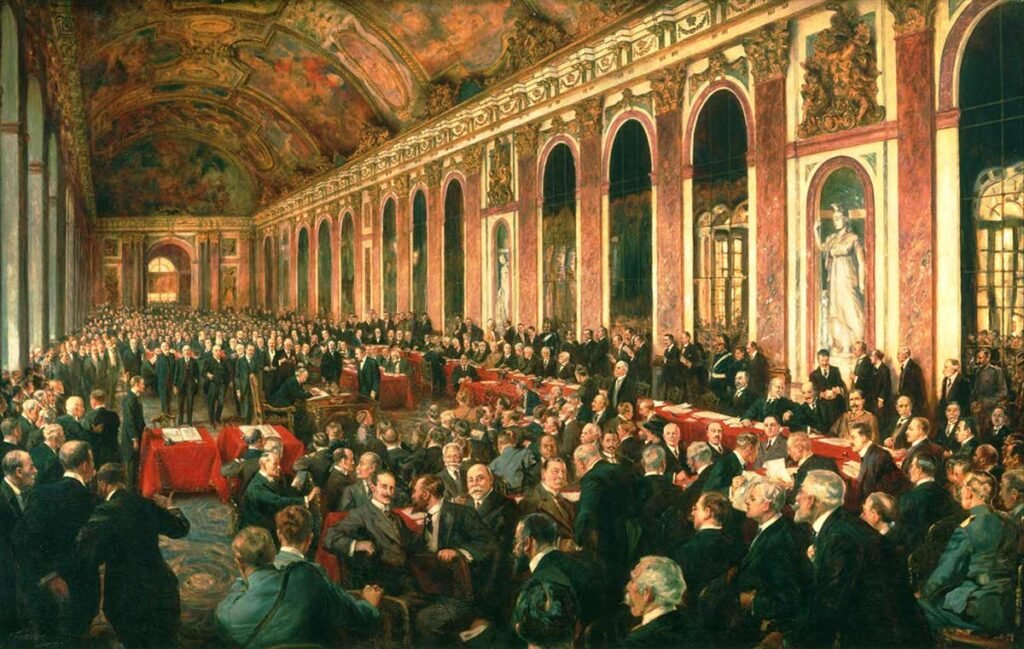The Origins of Nazi Germany: Setting the Stage
The story of Nazi Germany is one of the most complex and tragic in modern history. To understand how Adolf Hitler and the Nazi Party rose to power and plunged the world into war, it is essential to trace the origins and context that set the stage for their ascendancy. This article, the first in an extensive series, will delve into the political, social, and economic conditions in Germany leading up to the emergence of the Nazi Party.
The Aftermath of World War I
The seeds of Nazi Germany were sown in the aftermath of World War I. The war, which lasted from 1914 to 1918, left Germany defeated and devastated. The Treaty of Versailles, signed in June 1919, imposed harsh penalties on Germany. These included substantial territorial losses, severe military restrictions, and hefty reparations to the Allied powers. The treaty’s “War Guilt Clause” placed full responsibility for the war on Germany, a stipulation that many Germans found humiliating and unjust.
Economic Hardships
The economic impact of the Treaty of Versailles was profound. The reparations demanded of Germany strained its economy, leading to hyperinflation and massive unemployment. By 1923, the German mark had lost nearly all its value, plunging the middle class into poverty and creating widespread discontent. The economic instability eroded trust in the Weimar Republic, Germany’s fledgling democratic government established in 1919.
Political Instability
Politically, the Weimar Republic was marked by fragmentation and volatility. Numerous political parties vied for power, ranging from communists on the left to nationalists on the right. This fragmentation made it difficult to form stable governments. Frequent changes in leadership and coalition governments characterized the Weimar period, contributing to a sense of instability and ineffectiveness.

Photograph by Joseph Finnemore
Image Source: The National Museum of Australia
Social Upheaval
The social fabric of Germany was also under strain. The war had left a deep scar on German society, with millions of casualties and widespread suffering. Veterans returning from the front lines faced a society that had changed dramatically in their absence. The loss of traditional values and the rapid modernization of society created a sense of alienation and disillusionment among many Germans.
The Rise of Extremist Ideologies
In this environment of economic hardship, political instability, and social upheaval, extremist ideologies began to gain traction. Among these was the National Socialist German Workers’ Party, commonly known as the Nazi Party. Founded in 1919 as the German Workers’ Party, it was initially a small and insignificant group. However, it quickly gained momentum under the leadership of Adolf Hitler, who joined the party in 1920 and became its leader in 1921.
The Nazi Party’s Early Years
The Nazi Party’s early platform was a mix of nationalism, anti-Semitism, and anti-communism. It capitalized on the widespread dissatisfaction with the Treaty of Versailles and the economic hardships facing Germany. The party’s 25-point program, announced in 1920, called for the unification of all Germans, the abrogation of the Versailles Treaty, and the exclusion of Jews from German citizenship. These ideas resonated with many Germans who felt betrayed by their government and humiliated by the international community.
Hitler’s Rise to Prominence
Adolf Hitler’s rise to prominence within the Nazi Party was due in large part to his exceptional oratory skills and his ability to tap into the fears and aspirations of the German people. His speeches were characterized by a mix of passionate rhetoric and charismatic delivery, which drew large crowds and increased the party’s visibility. Hitler’s message of national rejuvenation and his promise to restore Germany’s former glory struck a chord with a populace desperate for change.
The Beer Hall Putsch
One of the pivotal events in the early history of the Nazi Party was the Beer Hall Putsch of 1923. Inspired by Mussolini’s successful March on Rome, Hitler and his followers attempted to overthrow the Weimar government by force. The coup failed, and Hitler was arrested and sentenced to prison. However, the trial and his subsequent imprisonment provided him with a national platform to spread his ideas. During his time in prison, Hitler wrote Mein Kampf, outlining his vision for Germany and his ideological beliefs.
The origins of Nazi Germany are deeply rooted in the tumultuous period following World War I. The combination of economic hardship, political instability, and social upheaval created a fertile ground for extremist ideologies. The Nazi Party, under the charismatic leadership of Adolf Hitler, capitalized on these conditions, setting the stage for its rise to power. This article marks the beginning of a comprehensive exploration of Nazi Germany, tracing the intricate and often tragic path from its origins to its eventual downfall.
In the next article, we will delve into the ideological foundations of the Nazi Party, examining the influences and ideas that shaped its core beliefs and policies.
Details of the featured image
Creator: Hoffmann, Heinrich
Catalogue number: MH 11040
Part of – Imperial War Museum Photograph Archive Collection
Next | Nazi Germany – Part 2
Author
Ziara Walter Akari
© www.apotheosislife.com
